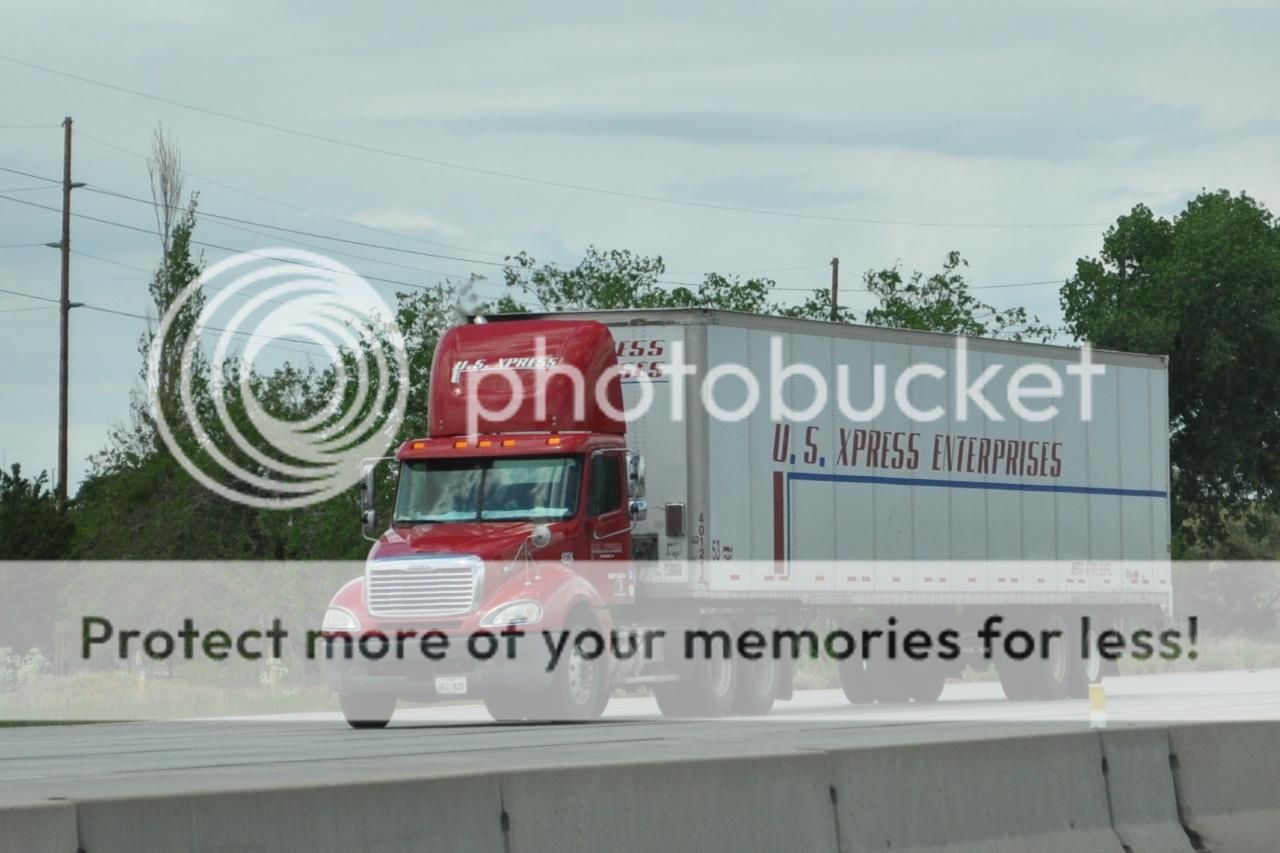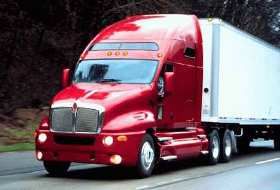Schneider Bulk - Leaving For Training Today!
Topic 702 | Page 6

Awesome Richard. I'll be in Cory tomorrow morning but I won't be staying too long. Going home for Thanksgiving. As always feel free to send me questions as they come up.
Good luck!
I'll be in Cory on 03Dec2013 for class on the 4th. Text me if your up there anytime during my training.

Hey ThinksTooMuch, I had a question about your hours.
I have read that the other freight haulers occasionally have the early morning or late pick-ups/deliveries. Have you found your hours slightly more steady in the bulk division? I am thinking that the pick-up/delivery locations may have more steady hours making your pick-ups/deliveries in a better part of the day. Not that it matters so much, just curious.

I can only tell you my experience obviously but in short... Yes. All of my deliveries have been between 0600 - 1800. Maybe I've just been lucky though.

I'll be in Cory on 03Dec2013 for class on the 4th. Text me if your up there anytime during my training.
Me too! Start Schneider tanker training on Dec 4 in Cory.
Steven, it seems to be refrigerated carriers that get appointment times in the middle of the night far more often than other types of freight. Compared with the others, here's why:
1) Dry van - normally you can do drop/hooks instead of live loading and unloading when it will be in the middle of the night. Major trucking companies try to make these arrangements when possible. Refrigerated carriers don't get nearly as many drop-n-hooks because they have the reefer running, so the reefer unit needs to be monitored and the fuel level also. So they can't just drop a loaded trailer and leave it for a week the way you can with dry van.
2) Flatbed - you normally need man-powered equipment like cranes and forklifts to load and unload flatbeds so you don't get nearly as many 3rd shift loading and unloading as you will with refrigerated
3) Tanker - you normally have to have someone from the customer and the driver present during loading and unloading to monitor the progress and make sure all of the equipment is working properly. A small leak in a hose, an overflowing tank, or an improperly vented tank can have catastrophic effects. So again, you don't get nearly as many 3rd shift loading and unloading as you will with refrigerated
Refrigerated customers also tend to run three shifts - mostly grocery warehouses. They get such a massive amount of freight in and out that they run around the clock. And because the reefer units need to be monitored the drivers have to live load and live unload versus drop-n-hook.
That's a quick rundown and I've surely left out a few points but that gives you the basics behind who gets more daytime appointments, who doesn't, and why.
Dry Van:
A trailer or truck that that requires no special attention, such as refrigeration, that hauls regular palletted, boxed, or floor-loaded freight. The most common type of trailer in trucking.Reefer:
A refrigerated trailer.
HOS:
Hours Of Service
HOS refers to the logbook hours of service regulations.OWI:
Operating While Intoxicated

Steven, it seems to be refrigerated carriers that get appointment times in the middle of the night far more often than other types of freight. Compared with the others, here's why:
1) Dry van - normally you can do drop/hooks instead of live loading and unloading when it will be in the middle of the night. Major trucking companies try to make these arrangements when possible. Refrigerated carriers don't get nearly as many drop-n-hooks because they have the reefer running, so the reefer unit needs to be monitored and the fuel level also. So they can't just drop a loaded trailer and leave it for a week the way you can with dry van.
2) Flatbed - you normally need man-powered equipment like cranes and forklifts to load and unload flatbeds so you don't get nearly as many 3rd shift loading and unloading as you will with refrigerated
3) Tanker - you normally have to have someone from the customer and the driver present during loading and unloading to monitor the progress and make sure all of the equipment is working properly. A small leak in a hose, an overflowing tank, or an improperly vented tank can have catastrophic effects. So again, you don't get nearly as many 3rd shift loading and unloading as you will with refrigerated
Refrigerated customers also tend to run three shifts - mostly grocery warehouses. They get such a massive amount of freight in and out that they run around the clock. And because the reefer units need to be monitored the drivers have to live load and live unload versus drop-n-hook.
That's a quick rundown and I've surely left out a few points but that gives you the basics behind who gets more daytime appointments, who doesn't, and why.
Thanks, Brett, for the thorough answer as usual. I'm sure there are others that will benefit from your answer as well as I did. I think my choices now are going to be tanker, flat bed, dry van, and lastly reefer. Of course, that may change once I start in with all my pre-hires , etc. But this is what I think I want to do. We shall see. In a way, I wish I could do them all, but I know that is not realistic at this point.
Dry Van:
A trailer or truck that that requires no special attention, such as refrigeration, that hauls regular palletted, boxed, or floor-loaded freight. The most common type of trailer in trucking.Pre-hire:
What Exactly Is A Pre-Hire Letter?
Pre-hire letters are acceptance letters from trucking companies to students, or even potential students, to verify placement. The trucking companies are saying in writing that the student, or potential student, appears to meet the company's minimum hiring requirements and is welcome to attend their orientation at the company’s expense once he or she graduates from truck driving school and has their CDL in hand.
We have an excellent article that will help you Understand The Pre-Hire Process.
A Pre-Hire Letter Is Not A Guarantee Of Employment
The people that receive a pre-hire letter are people who meet the company's minimum hiring requirements, but it is not an employment contract. It is an invitation to orientation, and the orientation itself is a prerequisite to employment.
During the orientation you will get a physical, drug screen, and background check done. These and other qualifications must be met before someone in orientation is officially hired.
Pre-hires:
What Exactly Is A Pre-Hire Letter?
Pre-hire letters are acceptance letters from trucking companies to students, or even potential students, to verify placement. The trucking companies are saying in writing that the student, or potential student, appears to meet the company's minimum hiring requirements and is welcome to attend their orientation at the company’s expense once he or she graduates from truck driving school and has their CDL in hand.
We have an excellent article that will help you Understand The Pre-Hire Process.
A Pre-Hire Letter Is Not A Guarantee Of Employment
The people that receive a pre-hire letter are people who meet the company's minimum hiring requirements, but it is not an employment contract. It is an invitation to orientation, and the orientation itself is a prerequisite to employment.
During the orientation you will get a physical, drug screen, and background check done. These and other qualifications must be met before someone in orientation is officially hired.
Reefer:
A refrigerated trailer.
HOS:
Hours Of Service
HOS refers to the logbook hours of service regulations.OWI:
Operating While Intoxicated

The pre-work screen is basicly a little simulation of the work environment. They make you lift some weights, do some squats, walk around on a catwalk, kneel down, and so on. Then they measure your heart rate between all of these to make sure you don't go over whatever the maximum heart rate is for someone of your age and weight.
When you get your confirmation from the recruiter that you are going to training they send you and email with a video showing what the pre-work screen is.
Actually here is a link to a video about Schneider's pre-work screening.
Just put that link into your VLC Player or Windows Media Player. It's about 3 minutes long.
How far and how many times do u have to walk carrying the weight
OWI:
Operating While Intoxicated
Not very far, it was like across the room and back or something like that. There was a slightly harder test for the people who were applying for the dedicated jobs where you had to unload (like doller general), but for the other drivers, I'd say that you would really have to be in very poor condition or have a health issue or physical condition to fail it.

Not very far, it was like across the room and back or something like that. There was a slightly harder test for the people who were applying for the dedicated jobs where you had to unload (like doller general), but for the other drivers, I'd say that you would really have to be in very poor condition or have a health issue or physical condition to fail it.
Ya that's y I asked I'm going for a jc penny account and I'm way over weight lol but have a bad habit of holding my breath lol I was going to prep up for test but thank u for the reply
New Reply:
New! Check out our help videos for a better understanding of our forum features

















Preview:
This topic has the following tags:
Schneider National Hard Lessons Learned On The Road In Training Reports From CDL Training Truck Driver Training Truck Driving Orientation







 TT On Facebook
TT On Facebook
Awesome Richard. I'll be in Cory tomorrow morning but I won't be staying too long. Going home for Thanksgiving. As always feel free to send me questions as they come up.
Good luck!